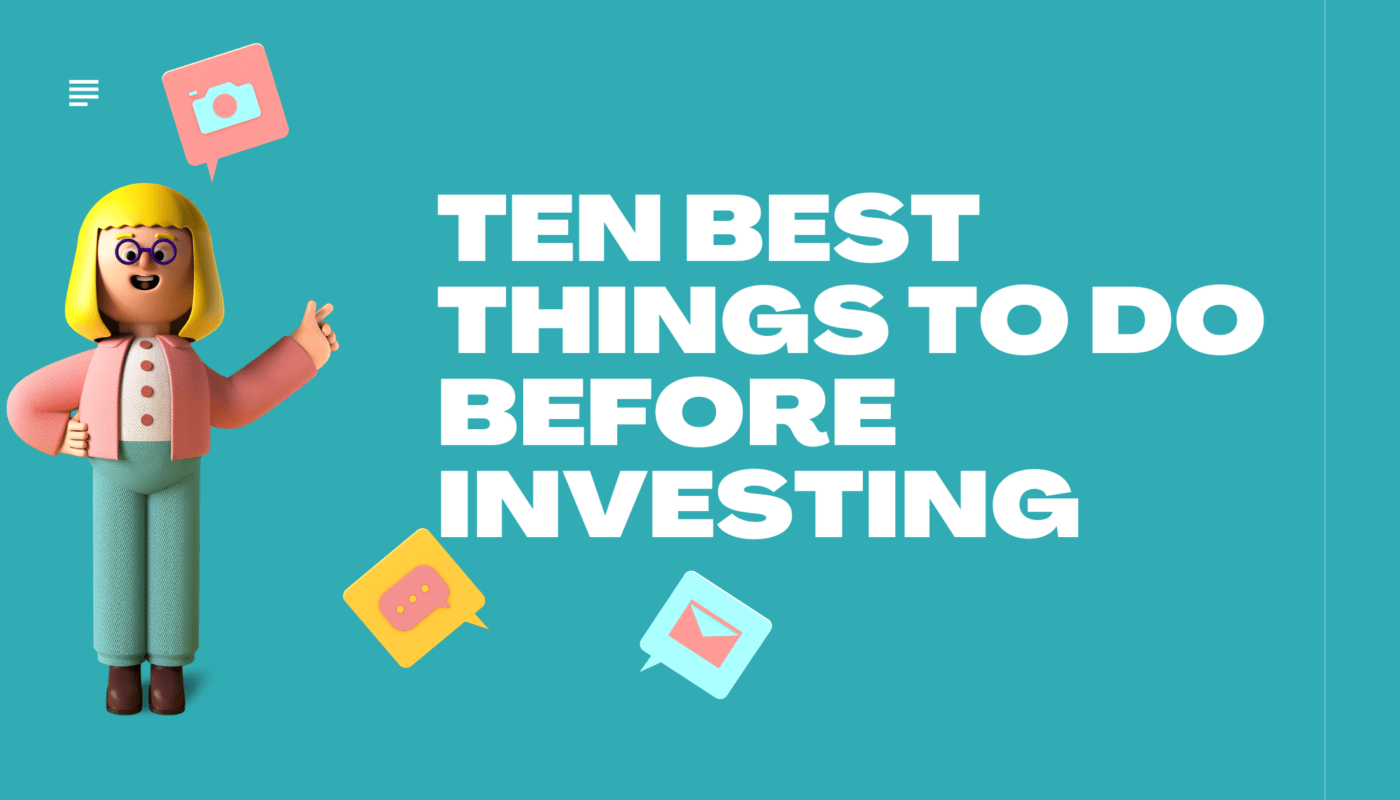Investing can be daunting and confusing, especially when there are so many options available to you. However, if you take the time to find an investment strategy that works best for you, it can be incredibly rewarding both financially and emotionally. While no one knows exactly what the future holds, doing these ten things will give you the best chance at achieving financial freedom and retiring early.

- Invest in yourself
- Make savings a routine
- Build an emergency corpus
- Start early
- Secure your health and Life
- Write your goals clearly and talk to your spouse
- Keep reviewing your progress
- Don’t compare your progress with others
- Don’t over interfere with the process
- Never stop learning
1) Invest in Yourself:
The first and best thing you should do before your financial journey is to invest in yourself. Investing in yourself means that you take care of both your body and mind so that you remain in harmony. Most of us think that exercising is only for the body. Hitting a gym, cycling,and swimming are given more importance. Of course they are definitely important and should be done.However, if your mind is not in a right state things will go awry. Make sure that you exercise for both your body and mind.
Ten minutes of meditation, remaining silent for ten minutes a day, a small morning walk in a park or your garden, watching the birds, listening to soulful music or anything will add value to your life. Take up some hobbies that will free you from your stressful life. Never, underestimate this. If you are healthy both physically and mentally then everything you desire will come true. Because, that is when you work with utmost dedication, utmost focus and utmost clarity.
2) Make savings a routine:
Rich people don’t spend the money from their earnings and save the rest. They save the money first and then spend what’s remaining. Make savings a routine. Every month be sure that you save some amount of money first and then think of spending the rest.
If you are a salaried person it is very easy to do this. Just automate your monthly SIPs or any other savings through your bank thereby you don’t have to decide every time to save. Automation makes the process easy and it helps in building a good habit without much effort. However, if you are not a salaried individual and your income varies every month you should try doing Income Averaging.
3) Build an emergency corpus:
We don’t know what the future holds for us. Emergency may come to any of us. People who are not self employed may have job threats or even for self employed there may be times where he/she cannot go to work due to reasons like health, family issues and so on. Building an emergency corpus comes handy in those times.
This is very important because, once we start investing we should never touch the investment amount as the plan for financial freedom is usually a longer form of game like a marathon and not a sprint.
Usually, the emergency corpus should be at least six times your monthly expenses. Say your monthly expense is about 25000 then your emergency corpus should be at least 25000 * 6 = 150000 /-
4) Start Early:
The best time to start investing is from the first month of your income. Starting early has many advantages. Most of the people would be in their prime age group of 22-27. And most of them will be unmarried and so the expenses will be much lesser. This period is the golden period in the investing journey. Save and invest as much as possible in this period.
Don’t worry about how small the amount you are investing. In an investing journey it is the Time you spend is more important than the amount you invest. Even a SIP of 500 every month can grow into a massive portfolio provided you have clarity in your thoughts and have conviction in your method of investing.
5) Secure your health and life:
Most people are very confident when it comes to their own health. They think that they are very healthy and nothing can happen to them (confirmatory bias). But health insurance is not only for people who expect diseases or any other illnesses.
In the initial days of your investing the amount you invest in early stages should not be touched unnecessarily. You should try to be immune to surprises life throws at you as much as possible. Let me tell you an example, suppose if a person meets with an accident and if it happens that he has to spend two – three weeks in an ICU of a private hospital. Imagine the amount he has to shell out from his / her pocket. It may wipe away even his two – three years of savings if the person is an average middle class.
Another thing is, taking life insurance. Many people keep on searching about taking life insurance, types of insurance, riders add ons associated with it, premiums etc,. See, dont keep on making the things complex, just take any plain life insurance (don’t go for add ons) with good reputed companies and relax. In case of an untoward incident, even if the person dies (unfortunately) in his/her journey to financial freedom,he/she can secure their spouse, son / daughter with a good lumpsum amount.
6) Write your goals clearly and talk to your spouse:
In an investment journey the most important problem for an investor is not knowing actually what you want from being financially independent. Things like how much corpus you should plan for retirement, how much you will need, what you plan to do after becoming free financially and so on will require much deeper insights. It is easier said than done. Write all your goals clearly and make sure that it fits your lifestyle. If you are not clear about what I am talking about, check here.
Life is not only about you. Your spouse, children should also yearn for the same things as you. Your spouse’s desires or plans may be completely different from yours. Talk everything about it to your spouse. If your spouse is not that much interested in understanding personal finance, make them understand that you do it for a larger goal.You can’t drag a train to a destination by pulling in opposite directions. You will soon be exhausted. Never, underestimate this step.
7) Keep Reviewing your progress:
Once the goals are set and you start your investing journey, always keep a track of what’s happening. Just watch the progress and don’t make any judgements too early. Review, whether any particular asset class is growing too much or too slow, whether balancing your portfolio is necessary, whether the amount you are investing in a particular asset has to be ramped up like that. There are multiple tools and platforms available out there to find out whether you are on the right path to financial freedom.
If you are not an expert to review things for yourself, never hesitate to find a fee-only financial planner. Fee only planners – charge a specific fee for reviewing your portfolios irrespective of the value. Clear all your doubts with them and invest with confidence.
8) Don’t compare your progress with others:
Once you have decided your strategy for investing whether it is based on fundamental analysis, technical analysis, Techno- Funda analysis, any passive investing like index investing or any other method, don’t keep on comparing with others investing models. Their goal, risk appetite may not be the same as yours.
For example, a pure technical Investor will keep on churning the portfolio frequently based on his/her own analysis. This may not hold good for you if you are a fundamental analysis based investor. Even if you compare yourself with other fundamental investors this may also affect your confidence. The person you are comparing may be investing based on some other values which are completely different from yours.
9) Don’t over interfere with the process:
The biggest mistake one tends to do is over interfering with the strategies. Once you are confident with the strategy and your conviction is good, stick to the process. If you are a long term investor, you should never worry about the short term hiccups.
Just observe whether the conditions you bought the stocks / any other assets have changed or not. If not then don’t interfere with the investments. Most retail investors have no conviction on their strategies and they keep on hopping from one to other, ending up with nothing. Frequently changing the strategies will leave you confused and you would not have gained any knowledge.
10) Never Stop Learning:
Known is a drop and unknown is an ocean. Keep on practicing what you do and try to learn something new daily. Keep in mind, learning does not mean that you watch those stock market news channels and get carried away in the tips they give you or the rumors you hear in their channels. Never ever take investment decisions based on news.
The main job of the news channels is to feed you two emotions. One is fear and the other is greed. Just take them with a pinch of salt and do your investments as planned. By learning I mean to improve the process by which you are investing. If you are a fundamental investor, become proficient enough to read the annual reports of the companies in a very quick time. Sharpen your assessment, apply common knowledge.
Conclusion:
The ten things that we described above are just to give an insight into the investing journey. There are many other things and there will be many other things that you should take note of. The first few years of your investing journey is very important. Once the process sets in then it is not far away from achieving your dream of financial freedom.




One thought on “10 Best Things You Should Do Before Investing For Financial Freedom”